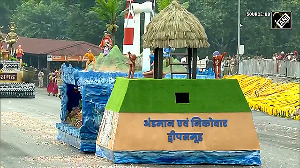Mediapersons need to retain their objectivity and exercise responsibility to avoid damaging the national interest, visiting chief editor of the Pioneer newspaper Chandan Mitra told journalists in London.
Mitra was recently nominated to the Rajya Sabha. He will take the place of veteran journalist Kuldip Nayar from October. At present, he is visiting London as a guest of the British government.
Addressing members of the Indian Journalists Association, he said it was not entirely possible for journalists to maintain absolute objectivity since "every media person is an individual and has a point of view. You can always take a position, but when you enter the news room, you leave your hat outside."
Asked his views on the relationship between government and media, he said, "Either we become cynical and see politicians as opportunists, or some journalists become so close to politicians, they become politicians themselves."
"Is there a third way?"
"I'm not a cynic and I hope I don't become one. In India, where the media has had an impact on various issues, it is important for journalists to have convictions and believe that they will make a difference. Otherwise, it does not work."
In his personal life, Mitra had moved away from the Left parties to support right-wing parties. But he still clings to the belief that it is not for the media to support individual politicians, parties or ideologies.
"Moreover, when it comes to issues of national importance, for example foreign and defence policies, there is a need to work towards consensus."
Mitra cited his own experience of working within the consensus framework when he cited Kuldip Nayar's remarks during a Rajya Sabha debate that (India's external intelligence gathering agency) Research and Analysis Wing was active across the border in Sindh.
Nayar's remarks were expunged from the record on the orders of the Rajya Sabha chair, even though they had been broadcast live.
Nevertheless, Mitra's decision to comment on Nayar's remarks in the following day's edition led to his being hauled up before the privileges committee in Parliament, which later exonerated him.
Mitra's belief that he acted responsibly is in sharp contrast to what he describes as irresponsible media behaviour during the hijacking of an Indian Airlines plane to Kandahar in December 1999.
"There were cameras outside the prime minister's house 24 hours a day broadcasting images of people carrying placards saying: Release Masood Azhar. Every TV station in the world picked up that footage from Indian channels and it seemed that Indians had no faith in their government and they wanted the hijackers released."
"Later it turned out that the so-called relatives of the hijacked passengers had actually been paid by a political party to stage demonstrations to embarrass the government."
"The media made no attempt to probe who these people were and why they wanted Masood Azhar released," Mitra said.
"When complex issues are involved, the media doesn't always respond by reading up or following up on the issues."




